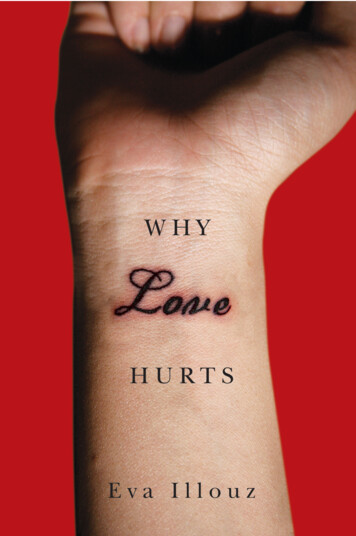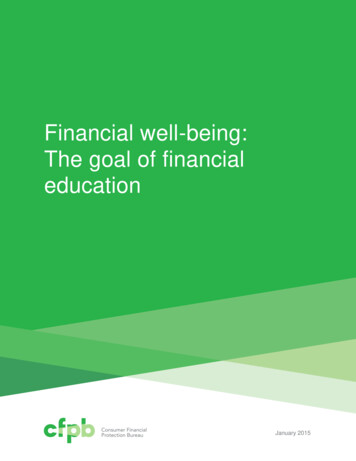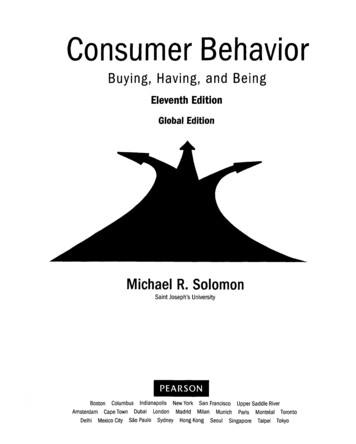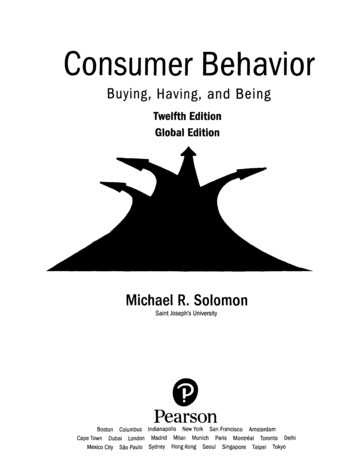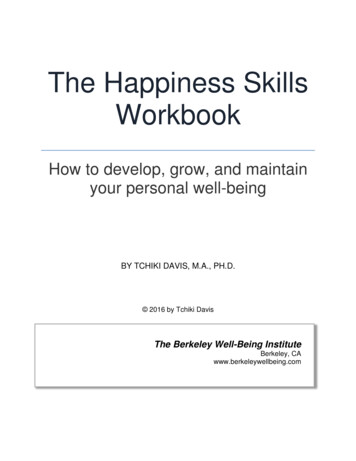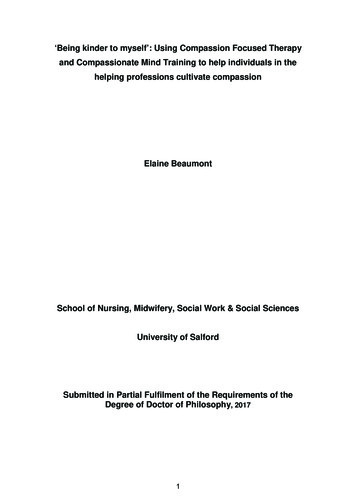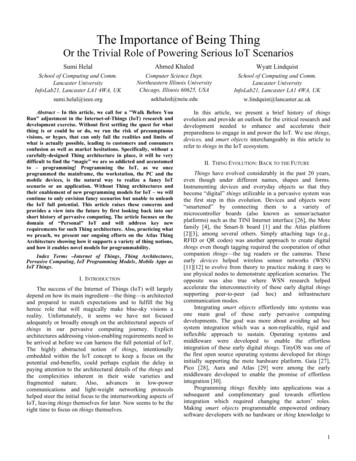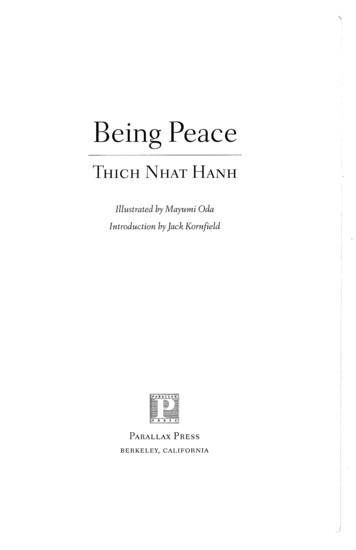
Transcription
Being PeaceTHICH NHAT HANHIllustrated by Mayumi OdaIntroduction by Jack KornfieldPARALLAX PRESSBERKELEY, CALIFORNIA
Parallax PressP.O. Box 7355Berkeley, California 94707\YW\V. parallax. orgParallax Press is the publishing divisionof Unified Buddhist Church, Inc.Copyright 1987, 2005 by the Unified Buddhist Church.All rights reserved.Printed in the United States of America on so% recycled paper.Original edition edited by Arnold Kotler.New edition edited by Rachel Neumann.Cover and text design by Gopa & Ted 2, Inc.Illustrations 1987 by Mayumi Oda. The drawings in Being Peace werecreated by Mayumi Oda specifically for this book. Please do not photocopy or otherwise reproduce them for any purposes whatsoever.Library of Congress Cataloging-in-Publication DataNhiH Hanh, Thich.Being peace /Thicb Nhat Hanh; with illustrations by Mayumi Oda;[edited by Rachel Neumann].- [Rev. ed.].p.cm.Originally published: Berkeley: Parallax Press, 1987.Collection of talks given during visit to U.S. in fall of 1985.ISBN 1-888375-40-X (pbk.)1. Religious life-Buddhism. 2. Buddhism-Doctrines. I. Neumann, Rachel. II. Title.BQ5410.N45 2005294.3'444--dc2220050137636 7 8 9 I 12 11 1o 09
CoNTENTSIntroduction by Jack Kornfield ""' 9l: Suffering Is Not Enough ""' 132: The Three Gems ""' 213: Feelings and Perceptions ""' 394: The Heart of Practice ,., 515: Working for Peace ""' 6 56: lnterbeing ,., 857: Meditation in Daily Life ,., 109
IntroductionjAcK KoRNFIELDIN THIS WONDERFUL BOOK, Thich Nhat Hanh teaches us thereality of interdependence: "Even if I just clap my hands, theeffect is everywhere, in the faraway galaxies."In 2007, we celebrate the twentieth anniversary of Being Peace.The publication of this seminal book and the Dharma teachingsofThich Nhat Hanh have had an extraordinary effect on D hannapractice in the Western world, especially visible here in America. At once simple and yet profound, poetic and clear, compassionate and inspiring, the writings and teachings ofThich NhatHanh have transformed Buddhist teachings from a distant idealinto the immediacy of the awakened heart.The Buddhist ancient stories tell how just the simple presence of a master is enough to touch the seeds of awakening in allthose around. Just as the fragrances of jasmine and rose bay andsandalwood bring beauty, the fragrance of one who walks andspeaks in harmony with the Dharma brings blessings whereverthey go.I've seen Thich Nhat Hanh walk slowly and mindfully into agathering of thousands of people and the simple power of his presence radiates a joy and peace that spreads to all those present.In the same way, the gracious and heartfelt writing you hold inyour hands calms the mind and opens the heart of wisdom.
IO I BEING PEACEThrough his being and his words, Thich Nhat Hanh invites usinto the reality of the present. Because he is a poet, his languagehas beauty, intimacy, and rich texture that illuminate the mind.Because he is courageous, he willingly pierces our great heart ofcompassion, so that we can bow to burning huts and sea pirates,to the sorrows of the world and those who cause sorrows.Because he is wise, his simple words speak to the most obviousDharma and to the truly profound levels of Buddha's awakening,all at one time. In doing so, he simultaneously unites the greatBuddhist schools of Theravada and Mahayana, following therich legacy of Vietnamese Dharma.Thich Nhat Hanh has helped us to to see the depths of dependent origination in a flower. In the midst of it all he has taughtus to breathe, to smile, to live with a free heart. And most importantly, in our troubled world he makes no false division betweeninner awakening and engaged compassion. To his eye, like hisspiritual ancestor Mahatma Gandhi, every being matters, everything is sacred.For well over half a centmy this revolutionary monk hasspread the teachings of Being Peace. This book is a treasure. Ifyou look deeply, you will see in it the seeds of all Thich NhatHanh's most important teachings, and the seeds of your ownawakening as well.May it bless all who touch its beautiful words.With Metta,Jack KornfieldSpirit Rock Meditation Center, 2005
If we are peaceful, if we are happy,we can blossom like a flower,and everyone in our family,our entire society,will benefit from, our peace,
1SuFFERINGIs Nor ENoUGHLIFE IS FILLED with suffering,but it is also filled with many wonders, such as the blue sky, the sunshine, and the eyes of a baby.To suffer is not enough. We must also be in touch with the wonders of life. They are within us and all around us, everywhere,anytime.If we are not happy, if we are not peaceful, we can't sharepeace and happiness with others, even those we love, those wholive under the same roof. If we are peaceful, if we are happy, wecan smile and blossom like a flower, and everyone in our family,our entire society, will benefit from our peace. Do we need tomake a special effort to enjoy the beauty of the blue sky? Do wehave to practice to be able to enjoy it? No, we just enjoy it. Eachsecond, each minute of our lives can be like this. Wherever weare, anytime, we have the capacity to enjoy the sunshine, thepresence of each other, even the sensation of our breathing. Wedon't need to go to China to enjoy the blue sky. We don't have totravel into the future to enjoy our breathing. We can be in touchwith these things right now. It would be a pity if we were onlyaware of suffering.We are so busy we hardly have time to look at the people welove, even in our own household, and to look at ourselves. Society is organized in a way that even when we have some leisure
14 I BEING PEACEtime, we don't know how to use it to get back in touch with ourselves. We have millions of ways to lose this precious time-weturn on the TV, or pick up the telephone, or start the car and gosomewhere. We are not used to being with ourselves, and we actas if we don't like ourselves and are trying to escape from ourselves.Meditation is to be aware of what is going on-in our bodies,in our feelings, in our minds, and in the world. Each day 4o,ooochildren die of hunger. The superpowers now have more thanso,ooo nuclear warheads, enough to destroy our planet manytimes. Yet the sunrise is beautiful, and the rose that bloomed thismorning along the wall is a miracle. Life is both dreadful andwonderful. To practice meditation is to be in touch with bothaspects. Please do not think we must be solemn in order to meditate. In fact, to meditate well, we have to smile a lot.Recently I was sitting with a group of children, and a boynamed Tim was smiling beautifully. I said, 'Tim, you have a verybeautiful smile," and he said, "Thank you." I told him, "You don'thave to thank me, I have to thank you. Because of your smile, youmake life more beautiful. Instead of saying, Thank you,' youcould say, 'You're welcome."'If a child smiles, if an adult smiles, that is very important. Ifin our daily life we can smile, if we can be peaceful and happy,not only we, but everyone will profit from it. This is the mostbasic kind of peace work. When I see Tim smiling, I am so happy.If he is aware that he is making other people happy, he can say,"You're welcome."
SUFFERING IS NOT ENOUGH I 15From time to time, to remind ourselves to relax, to be peaceful,we may wish to set aside some time for a retreat, a day of mindfulness, when we can walk slowly, smile, drink tea with a friend,enjoy being together as if we are the happiest people on Earth.This is not a retreat, it is a treat. During walking meditation, during kitchen and garden work, during sitting meditation, all daylong, we can practice smiling. At first you may find it difficult tosmile, and we have to think about why. Smiling means that weare ourselves, that we have sovereignty over ourselves, that weare not drowned in forgetfulness. This kind of smile can be seenon the faces of Buddhas and bodhisattvas.I would like to offer one short poem you can recite from timeto time, while breathing and smiling:Breathing in, I calm my body.Breathing out, I smile.Dwelling in the present momentI know this is a wonderful moment."Breathing in, I calm my body." Reciting this line is like drinking a glass of ice water-you feel the cold, the freshness, permeate your body. When I breathe in and recite this line, I actuallyfeel the breathing calming my body, calming my mind."Breathing out, I smile." You know the effect of a smile. Asmile can relax hundreds of muscles in your face, and relax yournervous system. A smile makes you master of yourself. That iswhy the Buddhas and bodhisattvas are always smiling. Whenyou smile, you realize the wonder of the smile."Dwelling in the present moment." While I sit here, I don'tthink of somewhere else, of the future or the past. I sit here, and
r6 I BEING PEACEI know where I am. This is very important. We tend to be alive inthe future, not now. We say, "Wait until I finish school and getmy Ph.D. degree, and then I will be really alive." When we haveit, and it wasn't easy to get, we say to ourselves, "I have to waituntil I have a job in order to be really alive." And then after thejob, a car. After the car, a house. We are not capable of being alivein the present moment. We tend to postpone being alive to thefuture, the distant future, we don't know when. Now is not themoment to be alive. We may never be alive at all in our entire life.Therefore, the technique, if we have to speak of a technique, isto be in the present moment, to be aware that we are here andnow, and the only moment to be alive is the present moment."I know this is a wonderful moment." This is the only momentthat is real. To be here and now, and enjoy the present momentis our most important task. "Calming, Smiling. Present moment,Wonderful moment." I hope you will try it.Even though life is hard, even though it is sometimes difficult tosmile, we have to try. Just as when we wish each other "Goodmorning," it must be a real "Good morning." Recently, one friendasked me, "How can I force myself to smile when I am filled withsorrow? It isn't natural." I told her she must be able to smile toher sorrow, because we are more than our sorrow. A human beingis like a television set with millions of channels. If we turn theBuddha on, we are the Buddha. If we turn sorrow on, we are sorrow. If we turn a smile on, we really are the smile. We can't letjust one channel dominate us. We have the seeds of everything
SUFFERING IS NOT ENOUGH I I7in us, and we have to take the situation in hand to recover ourown sovereignty.When we sit down peacefully, breathing and smiling, withawareness, we are our true selves, we have sovereignty over ourselves. When we open ourselves up to a TV program, we let ourselves be invaded by the program. Sometimes it is a goodprogram, but often it is just noisy. Because we want to havesomething other than ourselves enter us, we sit there and let anoisy television program invade us, assail us, destroy us. Even ifour nervous system suffers, we don't have the courage to standup and turn it off, because if we do that, we will have to returnto our self.Meditation is the opposite. It helps us return to our true self.Practicing meditation in this kind of society is very difficult.Everything seems to work in concert to try to take us away fromour true self. We have thousands of things, like videotapes andmusic, which help us be away from ourselves. Practicing meditation is to be aware, to smile, to breathe. These are on the opposite side. We go back to ourselves in order to see what is goingon, because to meditate means to be aware of what is going on.What is going on is very important.Suppose you are expecting a child. You need to breathe and smilefor the baby. Please don't wait until your baby is born beforebeginning to take care of him or her. You can take care of yourbaby right now, or even sooner. If you can't smile, that's very serious. You might think, "''m too sad. Smiling just isn't the correctthing to do." Maybe crying or shouting would be correct, but your
r8 IBEING PEACEbaby will get it-anything you are, anything you do, is for yourbaby.Even if you do not have a baby in your womb, the seed isalready there. Even if you are not married, even if you are a man,you should be aware that a baby is already there, the seeds offuture generations are already there. Please don't wait until thedoctors tell you that you are going to have a baby to begin to takecare of it. It is already there. Whatever you are, whatever you do,your baby will receive it. Anything you eat, any worries that areon your mind will be for him or her. Can you tell me that you cannot smile? Think of the baby, and smile for him, for her, for thefuture generations. Please don't tell me that a smile and your sorrow just don't go together. It's your sorrow, but what about yourbaby? It's not his sorrow, it's not her sorrow.Children understand very well that in each woman, in eachman, in each child, there is a capacity of waking up, of understanding, and of loving. Many children have told me that theycannot show me anyone who does not have this capacity. Somepeople allow it to develop, and some do not, but everyone has it.This capacity of waking up, of being aware of what is going on inyour feelings, in your body, in your perceptions, in the world, iscalled Buddha nature, the capacity of understanding and loving.Since the baby of that Buddha is in us, we should give him or hera chance. Smiling is very important. If we are not able to smile,then the world will not have peace. It is not by going out for ademonstration against nuclear missiles that we can bring aboutpeace. It is with our capacity of smiling, breathing, and beingpeace that we can make peace.
2THE THREE GEMSMANY OF us WORRY about the world situation. We don't knowwhen the bombs will explode. We feel that we are on the edge oftime. As individuals, we feel helpless, despairing. The situationis so dangerous, injustice is so widespread, the danger is so close.In this kind of situation, if we panic, things will only becomeworse. We need to remain calm, to see clearly. Meditation is tobe aware, and to try to help.I like to use the example of a small boat crossing the Gulf ofSiam. In Vietnam, there are many people, called boat people,who leave the country in small boats. Often the boats are caughtin rough seas or storms, the people may panic, and boats cansink. But if even one person aboard can remain calm, lucid,knowing what to do and what not to do, he or she can help theboat survive. His or her expression-face, voice-communicates clarity and calmness, and people have trust in that person.They will listen to what he or she says. One such person can savethe lives of many.Our world is something like a small boat. Compared with thecosmos, our planet is a ve1y small boat. We are about to panicbecause our situation is no better than the situation of the smallboat in the sea. You know that we have more than 5o,ooo nuclearweapons. Humankind has become a ve1y dangerous species. We
22 I BEING PEACEneed people who can sit still and be able to smile, who can walkpeacefully. \rVe need people like that in order to save us. Mahayana Buddhism says that you are that person, that each of you isthat person.I once had a student named Thich Thanh Van, who'd entered themonastery at the age of six. At the age of seventeen, he began tostudy with me. Later, he was the first director of the School ofYouth for Social Service, where he directed thousands of youngpeople working during the war in Vietnam, rebuilding villagesthat were destroyed, and resettling tens of thousands of refugeesfleeing the war zones. He was killed in an accident. I was inCopenhagen when I heard of the death of my student. He was avery gentle monk, ve1y brave.When he was a novice, six or seven years old, he saw peoplecome to the temple and bring cakes and bananas to offer to theBuddha. He wanted to know how the Buddha eats bananas, sohe waited until everyone went home and the shrine was closed,and then he peered through the door, waiting for the Buddhato reach out his hand, take a banana, peel it, and eat it. Hewaited and waited, but nothing happened. The Buddha did notseem to eat bananas, unless he realized that someone was spying on him.Thich Thanh Van told me several other stories about when hewas a young boy. When he discovered that the statue of the Buddha was not the Buddha, he began to ask where the Buddhas are,because it did not seem to him that Buddhas were living amonghumans. He concluded that Buddhas must not be very nice,
THE THREE GEMS I 23because when people became Buddhas, they would leave us togo to a faraway country. I told him that Buddhas are us. They aremade of flesh and bones, not copper or silver or gold. The Buddha statue is just a symbol of the Buddha, in the same way theAmerican flag is a symbol of America. The American flag is notthe American people.The root word "budh" means to wake up, to know, to understand. A person who wakes up and understands is called aBuddha. It is as simple as that. The capacity to wake up, tounderstand, and to love is called Buddha nature. When Buddhists say, "I take refuge in the Buddha," they are expressing trustin their own capacity of understanding, of becoming awake. TheChinese and the Vietnamese say, "I go back and rely on the Buddha in me." Adding "in me" makes it very clear that you yourselfare the Buddha.In Buddhism, there are three gems: Buddha, the awakenedone; Dharma, the way of understanding and loving; and Sangha,the community that lives in harmony and awareness. The threeare interrelated, and at times it is hard to distinguish one fromthe other. In everyone there is the capacity to wake up, to understand, and to love. So in ourselves we find Buddha, and we alsofind Dharma and Sangha. I will explain more about Dharma andSangha, but first I want to say something about Buddha, the onewho develops his or her understanding and loving to the highestdegree. (In Sanskrit, understanding is "prajfia" and love is"karuna" and "maitri.")Understanding and love aren't two separate things, they'rejust one. Suppose your son wakes up one morning and sees thatit is already quite late. He decides to wake up his younger sister,to give her enough time to eat breakfast before going to school.
24 I BEING PEACEIt happens that she is grouchy and instead of saying, 'Thank youfor waking me up," she says, "Shut up! Leave me alone!" andkicks him. He will probably get angry, thinking, "I woke her upnicely. Why did she kick me?" He may want to go to the kitchenand tell you about it, or even kick her back. But then he remembers that during the night his sister coughed a lot, and he realizes that she must be sick. Maybe she has a cold, maybe that iswhy she behaved in such a mean way. He is not angry anymore.At that moment there is budh in him. He understands, he isawake. When you understand, you cannot help but love. Youcannot get angry. To develop understanding, you have to practicelooking at all living beings with the eyes of compassion. Whenyou understand, you love. And when you love, you naturally actin a way that can relieve the suffering of people.Someone who is awake, who knows, who understands, iscalled a Buddha. Buddha is in eve1y one of us. We can becomeawake, understanding, and also loving. I often tell children thatif their mother or father is very understanding and loving, working, taking care of the family, smiling, and being lovely as a flower,they can say, "Mommy [or Daddy], you are all Buddha today."Two thousand five hundred years ago there was a person whopracticed in a way that his understanding and love became perfected, and everyone in the world recognized this. His name wasSiddhartha. When Siddhartha was ve1y young, he began tothink that life contained a lot of suffering, that people didn't loveand understand each other enough. So he left his home to go tothe forest to practice meditating, breathing, and smiling.
14 I BEING PEACE time, we don't know how to use it to get back in touch with our selves. We have million
